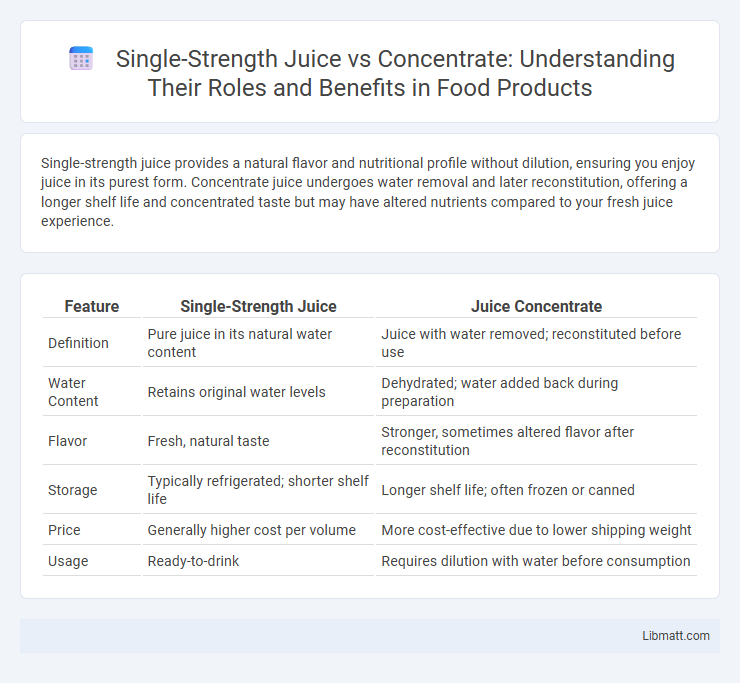Single-strength juice provides a natural flavor and nutritional profile without dilution, ensuring you enjoy juice in its purest form. Concentrate juice undergoes water removal and later reconstitution, offering a longer shelf life and concentrated taste but may have altered nutrients compared to your fresh juice experience.
Table of Comparison
| Feature | Single-Strength Juice | Juice Concentrate |
|---|---|---|
| Definition | Pure juice in its natural water content | Juice with water removed; reconstituted before use |
| Water Content | Retains original water levels | Dehydrated; water added back during preparation |
| Flavor | Fresh, natural taste | Stronger, sometimes altered flavor after reconstitution |
| Storage | Typically refrigerated; shorter shelf life | Longer shelf life; often frozen or canned |
| Price | Generally higher cost per volume | More cost-effective due to lower shipping weight |
| Usage | Ready-to-drink | Requires dilution with water before consumption |
Understanding Single-Strength Juice
Single-strength juice refers to juice extracted directly from fruits or vegetables and diluted to the natural concentration typically found in fresh produce, maintaining its original flavor and nutritional profile. Unlike juice concentrate, which is reduced by evaporating water and later reconstituted with water, single-strength juice requires no reconstitution and offers a fresher taste and higher vitamin content. You can choose single-strength juice for a more authentic, nutrient-rich drinking experience that closely resembles fresh-squeezed juice.
What Is Juice Concentrate?
Juice concentrate is fruit juice that has had most of its water content removed through evaporation, resulting in a thicker, more concentrated liquid or syrup form. This process reduces volume and weight, making it easier to store and transport, while retaining essential flavors and nutrients. When you buy juice concentrate, it is often reconstituted with water to create a beverage similar to single-strength juice.
Production Processes Compared
Single-strength juice is produced by directly extracting juice from fresh fruits or vegetables, preserving natural flavors and nutrients without alteration. Concentrate juice undergoes a production process that removes water through evaporation, reducing volume for easier storage and transportation, and is later reconstituted by adding water before packaging. These differing production methods impact flavor intensity, nutritional content, and shelf life of the final juice products.
Nutritional Differences
Single-strength juice contains natural levels of vitamins, minerals, and antioxidants as found in fresh fruit, offering a more authentic nutritional profile with higher enzyme activity. Concentrate juice undergoes water removal and reconstitution, which may reduce certain heat-sensitive nutrients like vitamin C and some polyphenols. Despite similar calorie and carbohydrate content, single-strength juice generally provides superior nutritional benefits due to minimal processing and preservation of bioactive compounds.
Flavor Profile and Taste
Single-strength juice maintains the natural flavor profile and balanced sweetness of the original fruit, preserving authentic taste nuances and freshness. Concentrate juice undergoes water removal, which intensifies flavors but can lead to a slightly altered, sometimes sweeter or more processed taste. You'll notice single-strength juice offers a more genuine and clean fruit taste compared to the richer, sometimes less natural flavor of concentrate.
Shelf Life and Storage
Single-strength juice typically has a shorter shelf life, lasting about 7 to 10 days when refrigerated, while juice from concentrate can last several months unopened if stored in a cool, dark place. Concentrated juice requires reconstitution with water before consumption and often comes in aseptic packaging, extending its stability without refrigeration. Proper storage conditions, such as maintaining a consistent temperature and avoiding direct sunlight, are crucial for preserving both types' quality and preventing spoilage.
Environmental Impact and Packaging
Single-strength juice typically involves less processing and often uses recyclable or biodegradable packaging, which reduces its overall environmental footprint compared to concentrated juice. Concentrate requires significant energy for water removal and later reconstitution, increasing carbon emissions during production and transportation. Packaging for concentrate is usually more compact, lowering shipping weight and associated fuel consumption, offering some sustainability advantages despite the higher processing impact.
Cost Analysis: Single-Strength vs Concentrate
Single-strength juice typically incurs higher transportation and storage costs due to its larger volume and lower shelf stability compared to concentrate, which is more cost-effective in bulk shipping and long-term storage. Concentrate reduces expenses by minimizing packaging and logistic requirements, making it a preferred choice for large-scale manufacturing and distribution. However, reconstitution costs and potential quality control measures can influence the overall cost-efficiency of concentrate in final product pricing.
Health Considerations and Additives
Single-strength juice retains its natural nutrient profile and typically contains no added sugars or preservatives, making it a healthier choice for those seeking minimal processing and maximum vitamin intake. Concentrate juice often undergoes heat processing and reconstitution, which may reduce certain heat-sensitive nutrients like vitamin C and include additional additives such as sweeteners or flavor enhancers. Consumers should check labels for added ingredients and opt for 100% juice varieties to avoid unnecessary sugars and artificial additives that can impact overall health.
Which Juice Option Is Right for You?
Choosing between single-strength juice and concentrate depends on your preference for freshness and convenience; single-strength juice offers a natural taste close to fresh fruit, while concentrate provides cost-effectiveness and longer shelf life. Single-strength juice typically contains no added sugars or preservatives, making it ideal for those prioritizing purity and nutritional value. Concentrate is often favored for cooking, baking, or bulk consumption due to its concentrated flavor and easier storage.
Single-Strength Juice vs Concentrate Infographic

 libmatt.com
libmatt.com